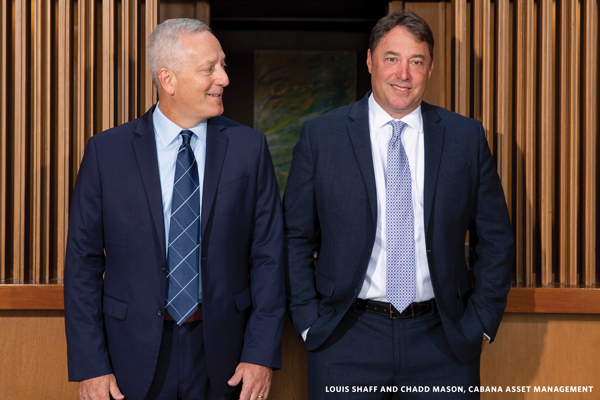Chadd Mason is friendly, talkative and self-effacing. He jokingly describes himself as an ambulance chaser when he talks about his successful practice as a personal injury and product liability lawyer. He fell in love with what he called “street law” in college in Denver, which gave him a chance to represent everyday people. He took on a number of high profile cases when he went back to his hometown of Fayetteville, Ark., in the 1990s. “I’ve tried every kind of case you can imagine from the car wrecks to divorces and criminal cases. Medical malpractice cases. Product liability. Monkey bites. ADA cases. If you can name a case, I’ve done it.” And it was always on the plaintiff side. “So I was always representing just people.” He’s also been a sitting judge.
But the route Mason took from those beginnings might be surprising. In the past 15 years, it led him to run a fast-growing financial advisory firm, Cabana, whose assets under management have ballooned from $26.5 million in discretionary assets at the end of 2016 to $470 million in mid-2018, largely by advising to outside RIAs. The firm, located in Fayetteville and Plano, Texas, also has 341 retail client accounts. The firm’s recent huge growth has been built on an investment algorithm Mason and his team developed from scratch in the mid-2000s.
After forming a hedge fund first, Mason and his partner Louis Shaff formed an RIA in the mid-2000s and christened it Cabana, based on the beach tents they had where they vacationed. This name now covers the firm and its various holding companies, including those that would eventually cover its insurance business and qualified-plan business.
From Chasing Ambulances To Chasing Returns
The “ambulance chaser” tag is said with irony, because Mason said he spent most of his legal career on the side of the little guy. In 2003, he resolved a case for a family whose members were hurt after a pedestrian bridge collapsed at a NASCAR race in North Carolina in May 2000. “In lawyer’s parlance, I hit a big lick.” That case won him enough that he was able to reflect on what he wanted to do in the future. He enjoyed those cases and felt he was on the people’s side of things, he says.
That quality of trusted advice wasn’t readily on display in the other field he was eyeing: financial services, he says. At around the same time he was litigating the NASCAR case, his own family ran into trouble. His grandfather had been a successful businessman and investor who died in 1997 with a $4 million estate. The money passed to heirs, including Mason’s mother, who were approached by a large national bank and its trust department. “I really had no experience at all in the financial services industry,” says Mason, “and didn’t know how to recommend one thing or another. [The bank] had the tallest building on the square and they had nice suits and a big boardroom.”
The family turned over the entire estate to the trust department, liquidating the grandfather’s mutual funds and putting them in proprietary products. “Lo and behold, what happens in 2000? We have a tech bubble. By 2002, these particular professionals had lost over 50% of my granddad’s money,” Mason says.
The bank tried explaining the vicissitudes of the markets to him, but to a lawyer like Mason, that wasn’t good enough. He went looking for answers himself. “Going back to my background being a street lawyer, litigator, that’s the most foreign thing you could ever say to a lawyer is you just take it. Lawyers are going to do something.”
With the windfall from his NASCAR case, he decided to step back and immerse himself in the world of finance. “And I mean I knew nothing. The first book I bought was Investing For Dummies. The first thing I learned was the difference between a bond and an equity. I basically laid in bed for two years and read math books on options.”
From Legal Eagle To Financial Shepherd
August 1, 2018
« Previous Article
| Next Article »
Login in order to post a comment
Comments
-
Interesting approach to gaining ALPHA. WE have partnered with both Law firms and CPS's. The pit falls to attorneys seem significant.








